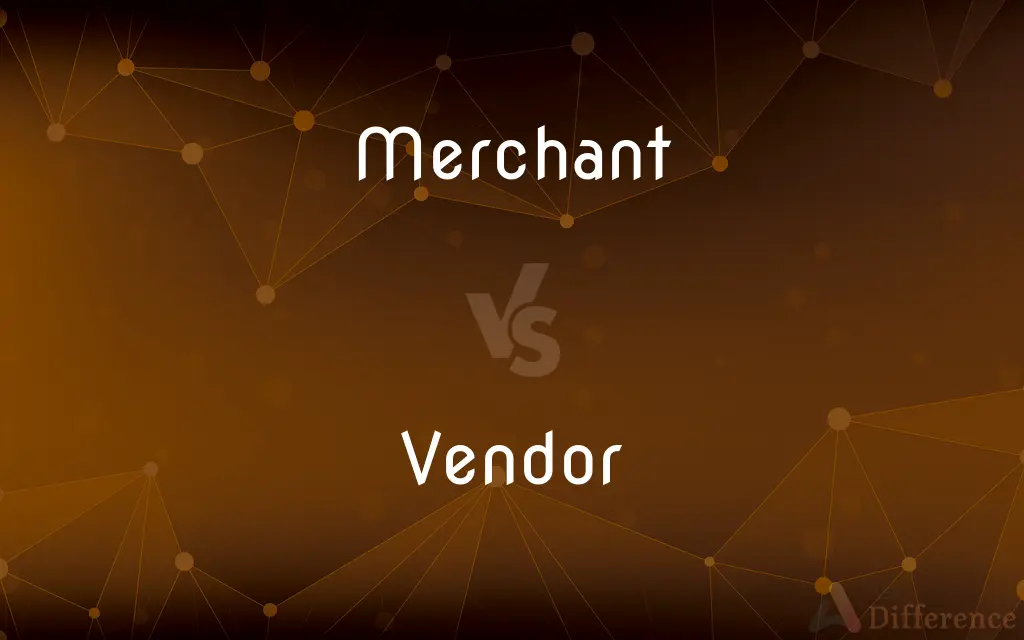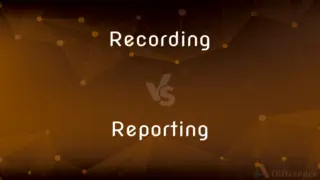Merchant vs. Vendor — What's the Difference?
By Urooj Arif & Maham Liaqat — Updated on February 25, 2024
A merchant is a person or company involved in wholesale trade, especially one dealing with foreign countries or supplying merchandise to a particular trade, while a vendor sells goods directly to consumers, often in smaller quantities.

Difference Between Merchant and Vendor
Table of Contents
ADVERTISEMENT
Key Differences
Merchants typically operate on a larger scale, dealing with the buying and selling of goods in bulk, often to other businesses rather than direct to consumers. Vendors, in contrast, are usually seen at the consumer level, selling products directly to the public, often in smaller quantities or individual items.
Merchants may specialize in a particular type of merchandise or market sector, engaging in both the purchase for resale and the distribution of goods, vendors are more commonly found in retail environments such as markets, street corners, or online platforms, focusing on the direct sale of goods to consumers.
A merchant's role can include a broader scope of activities, encompassing the import and export of goods, negotiating with manufacturers or producers, and focusing on the strategic aspect of trading. Vendors are more focused on the point-of-sale activities, customer interaction, and immediate retail transactions.
The term "merchant" conveys a sense of scale and permanence, often implying a settled business or an entity with a significant inventory, whereas "vendor" suggests mobility, flexibility, and a focus on retail sales, possibly without a fixed business location.
Both merchants and vendors are crucial to the supply chain, but their positions differ significantly: merchants act as intermediaries between producers and retailers or consumers, while vendors represent the final link, directly engaging with the end consumer.
ADVERTISEMENT
Comparison Chart
Scale of Operation
Larger, often wholesale
Smaller, typically retail
Customer Base
Businesses, retailers
End consumers
Scope of Work
Import/export, distribution
Direct sales, customer service
Business Model
Focused on bulk trade and specialization
Focused on retail transactions
Location
Fixed business location, online
Markets, street corners, online, mobile
Compare with Definitions
Merchant
Specializes in specific types of goods.
The wine merchant was well-known for his exquisite selection.
Vendor
Operates in retail environments.
Online vendors have become increasingly popular due to convenience.
Merchant
Often involved in international trade.
As a merchant, she frequently traveled abroad to source unique products.
Vendor
Focuses on individual or small-scale transactions.
Vendors at the market often sell their goods one item at a time.
Merchant
Deals in bulk quantities.
Merchants typically purchase stock in large quantities to get a better price.
Vendor
May be mobile or have a temporary setup.
Food vendors at the festival provided a wide range of dining options.
Merchant
Acts as an intermediary in the supply chain.
The merchant supplied local shops with imported goods.
Vendor
Sells goods directly to the public.
The street vendor offered a variety of fresh fruits and vegetables.
Merchant
A businessperson engaged in retail or wholesale trade.
The merchant ordered a new batch of goods for the upcoming season.
Vendor
Engages in direct customer interaction.
The vendor answered all the customer's questions about the product.
Merchant
A merchant is a person who trades in commodities produced by other people, especially one who trades with foreign countries. Historically, a merchant is anyone who is involved in business or trade.
Vendor
One that sells or vends something
A street vendor.
A vendor of software products on the Web.
Merchant
A person or company involved in wholesale trade, especially one dealing with foreign countries or supplying goods to a particular trade
A builders' merchant
A tea merchant
Vendor
A person or a company that vends or sells.
Merchant
One whose occupation is the wholesale purchase and retail sale of goods for profit.
Merchant
To be a merchant; to trade.
Merchant
A businessperson engaged in retail trade
Common Curiosities
Can a business be both a merchant and a vendor?
Yes, some businesses operate as both, buying in bulk (as merchants) and selling directly to consumers (as vendors).
How do merchants and vendors contribute to the economy?
Both play crucial roles in the supply chain, facilitating the movement of goods from producers to consumers and stimulating economic activity.
Do merchants have direct interaction with consumers?
While merchants primarily deal with businesses or retailers, some also interact with consumers, especially those who sell both wholesale and retail.
Are the terms "merchant" and "vendor" interchangeable?
While they can be used in similar contexts, their meanings differ based on the scale of operation and customer base.
Is there a difference in the types of products sold by merchants and vendors?
No specific difference in types, but merchants typically deal in bulk goods, while vendors sell individual items or smaller quantities.
How do market conditions affect merchants and vendors differently?
Merchants might adjust their inventory and pricing strategies based on wholesale market trends, while vendors react more directly to consumer demand and retail trends.
What challenges do merchants face that vendors do not?
Merchants often deal with more complex logistics and larger financial risks associated with bulk purchasing and international trade.
What trends are affecting merchants and vendors today?
E-commerce growth, consumer preference for local and sustainable products, and increased competition from online marketplaces are significant trends.
What legal requirements do merchants and vendors face?
Both must comply with local and national regulations, including licenses, taxes, and product safety standards.
Can vendors operate online?
Yes, many vendors sell goods directly to consumers through online platforms or their websites.
How do merchants and vendors decide on pricing?
Merchants consider the wholesale price and market demand, while vendors focus on retail pricing strategies, often influenced by consumer demand and competition.
How do merchants and vendors find their products?
Merchants often source products from manufacturers or international markets, while vendors might purchase from wholesalers, local producers, or merchants.
Can a vendor become a merchant?
Yes, a vendor can expand their business to start buying and selling goods in bulk, transitioning into a merchant.
What skills are important for merchants and vendors?
Both require strong business acumen, but merchants need skills in negotiation and logistics, whereas vendors benefit from customer service and sales skills.
How do technological advancements impact merchants and vendors?
Technology enables both to streamline operations, with merchants using it for logistics and inventory management, and vendors for sales platforms and marketing.
Share Your Discovery

Previous Comparison
Recording vs. Reporting
Next Comparison
Regenerate vs. RejuvenateAuthor Spotlight
Written by
Urooj ArifUrooj is a skilled content writer at Ask Difference, known for her exceptional ability to simplify complex topics into engaging and informative content. With a passion for research and a flair for clear, concise writing, she consistently delivers articles that resonate with our diverse audience.
Co-written by
Maham Liaqat















































